AR
-
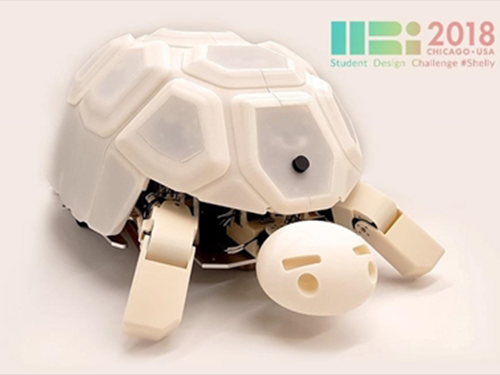 KAIST Student Wins HRI Student Design Competition
(From left: Jason Jangho Choi, Hyunjin Ku and Wonkyung Do)
Hyunjin Ku from the Department of Mechanical Engineering won the first prize at the Student Design Competition of Human-Robot-Interaction (HRI) 2018 which was held in Chicago.
Ku teamed up with undergrad students from Seoul National University (Jason Jangho Choi, Soomin Lee, Sunho Jang, and Wonkyung Do) and submitted Shelly, a tortoise-like robot for one-to-many interactions with children.
Figure 1. Shelly, a tortoise-like robot for one-to-many interactions with children
In the Student Design Competition of the HRI, students from around the globe can submit designs for their interactive robotic objects. The competition focused on human-agent interactions and practical applications.
Ku conducted the research while doing an internship at NAVER Labs. Her research on learning robot abuse with Shelly was published in IEEE Spectrum.
[YTN Science]
https://www.youtube.com/watch?v=n5KVwgBk0wk
[HRI 2018 Website]
http://humanrobotinteraction.org/2018/sdc/
[IEEE Spectrum]
https://spectrum.ieee.org/automaton/robotics/robotics-hardware/shelly-robotic-tortoise-helps-kids-learn-that-robot-abuse-is-a-bad-thing
2018.07.02 View 8180
KAIST Student Wins HRI Student Design Competition
(From left: Jason Jangho Choi, Hyunjin Ku and Wonkyung Do)
Hyunjin Ku from the Department of Mechanical Engineering won the first prize at the Student Design Competition of Human-Robot-Interaction (HRI) 2018 which was held in Chicago.
Ku teamed up with undergrad students from Seoul National University (Jason Jangho Choi, Soomin Lee, Sunho Jang, and Wonkyung Do) and submitted Shelly, a tortoise-like robot for one-to-many interactions with children.
Figure 1. Shelly, a tortoise-like robot for one-to-many interactions with children
In the Student Design Competition of the HRI, students from around the globe can submit designs for their interactive robotic objects. The competition focused on human-agent interactions and practical applications.
Ku conducted the research while doing an internship at NAVER Labs. Her research on learning robot abuse with Shelly was published in IEEE Spectrum.
[YTN Science]
https://www.youtube.com/watch?v=n5KVwgBk0wk
[HRI 2018 Website]
http://humanrobotinteraction.org/2018/sdc/
[IEEE Spectrum]
https://spectrum.ieee.org/automaton/robotics/robotics-hardware/shelly-robotic-tortoise-helps-kids-learn-that-robot-abuse-is-a-bad-thing
2018.07.02 View 8180 -
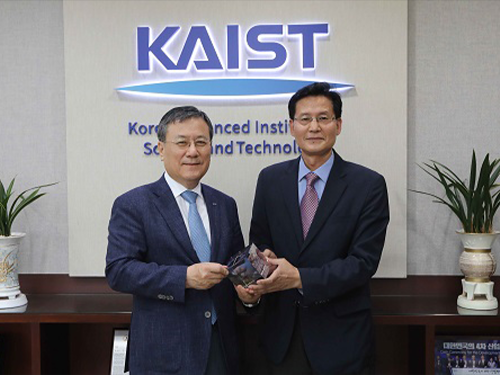 AST Holdings Makes a Donation to KAIST
(KAIST President Sung-Chul Shin and the CEO of AST Holdings, Haegyoo Seo)
KAIST President Sung-Chul Shin and the CEO of AST Holdings, Haegyoo Seo, agreed to a partnership on June 27 at the main campus of KAIST.
AST Holdings donated one hundred million KRW to the school for fostering experts in the field of augmented reality (AR). The fund will also go to joint research on AR technologies required smart cities.
AST Holdings, established in 1997, specializes in developing VR/AR contents. It has collaborated with Samsung Electronics and KIA Motors to produce various digital contents and develop solutions using VR/AR.
Research and development carried out by the Augmented Reality Research Center (ARRC) of KAIST aims to foster talented manpower and has accumulated crucial components of technology for contributing to research dissemination.
In particular, the ARRC established an industrial, academic, and research partnership that has suggested a new standard for industrial-academic joint research. Under this agreement, an industry assigns its staff to the research center to obtain new technical capabilities while the center strengthens the technological application of a study based on the industrial needs.
Through the partnership funds, the center can provide a stable research environment for young researchers and recruit talented manpower from around the world. The center has the potential to become a new model of industrial-academic research platforms that will take a leading role in the field of VR/AR.
CEO Seo said, “I would like to take the lead in research on VR/AR-based futuristic city platforms through this partnership with KAIST ARRC and the industrial-academic research program. I hope that this partnership between our company and KAIST will create synergy and secure crucial research, manpower, and basic technology according to our company’s needs.
President Shin added, “KAIST will pursue creating an exemplary case of industrial-academic cooperation with outstanding national and international manpower.”
2018.07.02 View 4737
AST Holdings Makes a Donation to KAIST
(KAIST President Sung-Chul Shin and the CEO of AST Holdings, Haegyoo Seo)
KAIST President Sung-Chul Shin and the CEO of AST Holdings, Haegyoo Seo, agreed to a partnership on June 27 at the main campus of KAIST.
AST Holdings donated one hundred million KRW to the school for fostering experts in the field of augmented reality (AR). The fund will also go to joint research on AR technologies required smart cities.
AST Holdings, established in 1997, specializes in developing VR/AR contents. It has collaborated with Samsung Electronics and KIA Motors to produce various digital contents and develop solutions using VR/AR.
Research and development carried out by the Augmented Reality Research Center (ARRC) of KAIST aims to foster talented manpower and has accumulated crucial components of technology for contributing to research dissemination.
In particular, the ARRC established an industrial, academic, and research partnership that has suggested a new standard for industrial-academic joint research. Under this agreement, an industry assigns its staff to the research center to obtain new technical capabilities while the center strengthens the technological application of a study based on the industrial needs.
Through the partnership funds, the center can provide a stable research environment for young researchers and recruit talented manpower from around the world. The center has the potential to become a new model of industrial-academic research platforms that will take a leading role in the field of VR/AR.
CEO Seo said, “I would like to take the lead in research on VR/AR-based futuristic city platforms through this partnership with KAIST ARRC and the industrial-academic research program. I hope that this partnership between our company and KAIST will create synergy and secure crucial research, manpower, and basic technology according to our company’s needs.
President Shin added, “KAIST will pursue creating an exemplary case of industrial-academic cooperation with outstanding national and international manpower.”
2018.07.02 View 4737 -
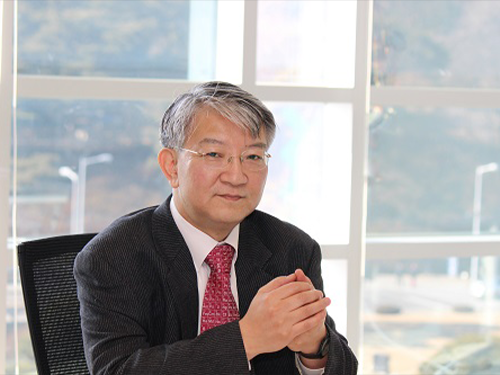 P.V. Danckwerts Memorial Lecture Awards Distinguished Professor Lee
(Distinguished Professor Sang Yup Lee)
Distinguished Professor Sang Yup Lee from the Department of Chemical and Biomolecular Engineering was selected as the awardee of the 2018 P.V. Danckwerts Memorial Lecture.
Professor Lee was named the recipient in recognition of his distinguished achievements developing innovative eco-friendly and sustainable chemical materials by applying metabolic engineering. The award is co-sponsored by the Chemical Engineering Science, the Institute of Chemical Engineers, the American Institute of Chemical Engineers, and the European Federation of Chemical Engineering.
The award ceremony and Professor Lee’s lecture will be held at the annual meeting of the American Institute of Chemical Engineers in October in Pittsburgh, PA in the US. He will give a lecture titled “Biotechnology to Help Achieve the UN’s Sustainable Development Goals.”
The P.V. Danckwerts Lecture was established in 1985 in honor of Professor Peter V. Danckwerts at the University of Cambridge who made significant contributions to the chemical engineering field. Professor Danckwerts served as executive editor of the Chemical Engineering Science and the president of the Institute of Chemical Engineers.
Professor Lee, currently the dean of KAIST Institutes, a multi-and interdisciplinary convergence research center, is taking the lead in biotechnology, especially in the field of metabolic engineering.
Professor Lee’s research team’s novel approaches have been gaining notable attention in the sustainable chemical engineering field and future health care innovations. His team recently presented research on drug-drug and drug-food interactions by using AI, a recombinant E.coli strain that biosynthesizes 60 different nanomaterials covering 35 elements on the periodic table, bio-degradable aromatic polymer’s enzyme production, and a molecular mechanism for PET degradation.
With this award, Professor Lee joined other prominent recipients including Dr. Neal Amundson at the University of Houston, the late Professor Octave Levenspiel at Oregon State University, and Professor Rutherford Aris at the University of Minnesota. Professor Lee is the second Asian recipient, following Dr. Mooson Kwauk at the Institute of Process Engineering of the Chinese Academy of Sciences who won the lecture award in 1989.
2018.06.18 View 5834
P.V. Danckwerts Memorial Lecture Awards Distinguished Professor Lee
(Distinguished Professor Sang Yup Lee)
Distinguished Professor Sang Yup Lee from the Department of Chemical and Biomolecular Engineering was selected as the awardee of the 2018 P.V. Danckwerts Memorial Lecture.
Professor Lee was named the recipient in recognition of his distinguished achievements developing innovative eco-friendly and sustainable chemical materials by applying metabolic engineering. The award is co-sponsored by the Chemical Engineering Science, the Institute of Chemical Engineers, the American Institute of Chemical Engineers, and the European Federation of Chemical Engineering.
The award ceremony and Professor Lee’s lecture will be held at the annual meeting of the American Institute of Chemical Engineers in October in Pittsburgh, PA in the US. He will give a lecture titled “Biotechnology to Help Achieve the UN’s Sustainable Development Goals.”
The P.V. Danckwerts Lecture was established in 1985 in honor of Professor Peter V. Danckwerts at the University of Cambridge who made significant contributions to the chemical engineering field. Professor Danckwerts served as executive editor of the Chemical Engineering Science and the president of the Institute of Chemical Engineers.
Professor Lee, currently the dean of KAIST Institutes, a multi-and interdisciplinary convergence research center, is taking the lead in biotechnology, especially in the field of metabolic engineering.
Professor Lee’s research team’s novel approaches have been gaining notable attention in the sustainable chemical engineering field and future health care innovations. His team recently presented research on drug-drug and drug-food interactions by using AI, a recombinant E.coli strain that biosynthesizes 60 different nanomaterials covering 35 elements on the periodic table, bio-degradable aromatic polymer’s enzyme production, and a molecular mechanism for PET degradation.
With this award, Professor Lee joined other prominent recipients including Dr. Neal Amundson at the University of Houston, the late Professor Octave Levenspiel at Oregon State University, and Professor Rutherford Aris at the University of Minnesota. Professor Lee is the second Asian recipient, following Dr. Mooson Kwauk at the Institute of Process Engineering of the Chinese Academy of Sciences who won the lecture award in 1989.
2018.06.18 View 5834 -
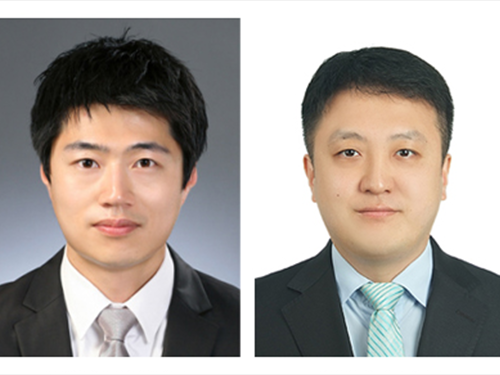 KAISTians Receive Future Ocean Science and Technology Awards
(From left: PhD candidates Minseok Kang and Junkeon Ahn)
PhD candidates Minseok Kang and Junkeon Ahn from the Department of Mechanical Engineering received Future Ocean Science and Technology Awards from the Korean Association of Ocean Science and Technology Societies (KAOSTS).
Since 2017, KAOSTS has conferred this award upon graduate students who have published outstanding papers on ocean science and technology in order to encourage young researchers in this area.
Kang published ‘Ship block assembly sequence planning considering productivity and welding deformation’ in Naval Architecture and Ocean Engineering in which he proposed an assembly sequence planning method for block assemblies that considers the geometric characteristics of blocks to determine feasible assembly sequences as well as assembly process and productivity factors.
Ahn published ‘Fuzzy-based FMEA of hybrid MCFC and gas turbine system for marine propulsion’ in Power Sources. In this research, he conducted a study proposing a fuzzy-based failure mode and effect analysis (FMEA) for a hybrid molten carbonate fuel cell and gas turbine system for liquefied hydrogen tankers.
2018.06.15 View 7810
KAISTians Receive Future Ocean Science and Technology Awards
(From left: PhD candidates Minseok Kang and Junkeon Ahn)
PhD candidates Minseok Kang and Junkeon Ahn from the Department of Mechanical Engineering received Future Ocean Science and Technology Awards from the Korean Association of Ocean Science and Technology Societies (KAOSTS).
Since 2017, KAOSTS has conferred this award upon graduate students who have published outstanding papers on ocean science and technology in order to encourage young researchers in this area.
Kang published ‘Ship block assembly sequence planning considering productivity and welding deformation’ in Naval Architecture and Ocean Engineering in which he proposed an assembly sequence planning method for block assemblies that considers the geometric characteristics of blocks to determine feasible assembly sequences as well as assembly process and productivity factors.
Ahn published ‘Fuzzy-based FMEA of hybrid MCFC and gas turbine system for marine propulsion’ in Power Sources. In this research, he conducted a study proposing a fuzzy-based failure mode and effect analysis (FMEA) for a hybrid molten carbonate fuel cell and gas turbine system for liquefied hydrogen tankers.
2018.06.15 View 7810 -
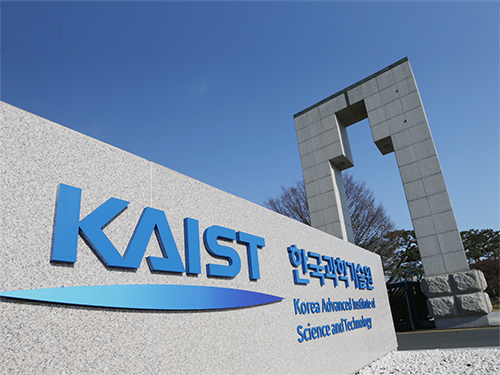 KAIST Ranked 40th in the QS World University Rankings
KAIST ranked 40th in the 2018 QS World University Rankings, one place higher than last year. According to the QS (Quacquarelli Symonds) World’s Top 100 universities released on June 7, KAIST is the second highest ranked Korean university among the five Korean universities listed, following Seoul National University which ranked 36th.
KAIST displayed outstanding performance by ranking 16th in citations per faculty. In the 2018 rankings, universities that are strong in science, technology, and engineering claimed some of the highest positions. MIT topped the list and Caltech took fourth, ETH Zurich seventh, followed by Imperial College London which took eighth.
According to the analysis compiled by QS, universities focusing on science and technology are dominating the global universities rankings. This tendency comes from the fact that engineering schools have an advantage when evaluating the quality of research according to the number of citations per faculty member.
Provost O Ok Park predicts that science and technology will be key players in the Fourth Industrial Revolution era. “In the coming years, universities that excel in multi and interdisciplinary research will lead future growth. KAIST also continues to focus on transdisciplinary education and research,” he said.
2018.06.07 View 4585
KAIST Ranked 40th in the QS World University Rankings
KAIST ranked 40th in the 2018 QS World University Rankings, one place higher than last year. According to the QS (Quacquarelli Symonds) World’s Top 100 universities released on June 7, KAIST is the second highest ranked Korean university among the five Korean universities listed, following Seoul National University which ranked 36th.
KAIST displayed outstanding performance by ranking 16th in citations per faculty. In the 2018 rankings, universities that are strong in science, technology, and engineering claimed some of the highest positions. MIT topped the list and Caltech took fourth, ETH Zurich seventh, followed by Imperial College London which took eighth.
According to the analysis compiled by QS, universities focusing on science and technology are dominating the global universities rankings. This tendency comes from the fact that engineering schools have an advantage when evaluating the quality of research according to the number of citations per faculty member.
Provost O Ok Park predicts that science and technology will be key players in the Fourth Industrial Revolution era. “In the coming years, universities that excel in multi and interdisciplinary research will lead future growth. KAIST also continues to focus on transdisciplinary education and research,” he said.
2018.06.07 View 4585 -
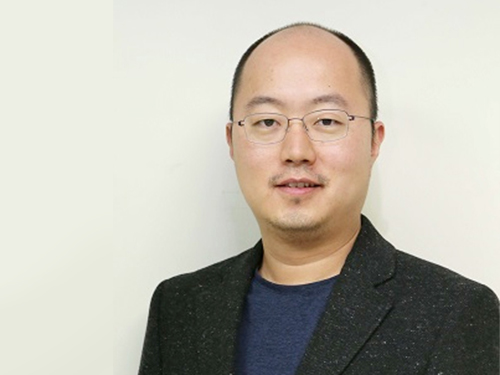 Professor YongKeun Park Wins the 2018 Fumio Okano Award
(Professor Park)
Professor YongKeun Park from the Department of Physics won the 2018 Fumio Okano Award in recognition of his contributions to 3D display technology development during the annual conference of the International Society for Optics and Photonics (SPIE) held last month in Orlando, Florida in the US.
The Fumio Okano Best 3D Paper Prize is presented annually in memory of Dr. Fumio Okano, a pioneer and innovator of 3D displays who passed away in 2013, for his contributions to the field of 3D TVs and displays. The award is sponsored by NHK-ES.
Professor Park and his team are developing novel technology for measuring and visualizing 3D images by applying random light scattering. He has published numerous papers on 3D holographic camera technology and 3000x enhanced performance of 3D holographic displays in renowned international journals such as Nature Photonics, Nature Communications, and Science Advances. His technology has drawn international attention from renowned media outlets including Newsweek and Forbes.
He has established two startups to commercialize his technology. Tomocube specializes in 3D imaging microscopes using holotomographic technology and the company exports their products to several countries including the US and Japan. The.Wave.Talk is exploring technology for examining pre-existing bacteria anywhere and anytime.
Professor Park’s innovations have already been recognized in and out of KAIST. In February, he was selected as the KAISTian of the Year for his outstanding research, commercialization, and startups. He was also decorated with the National Science Award in April by the Ministry of Science and ICT and the Hong Jin-Ki Innovation Award later in May by the Yumin Cultural Foundation.
Professor Park said, “3D holography is emerging as a significant technology with growing potential and positive impacts on our daily lives. However, the current technology lags far behind the levels displayed in SF movies. We will do our utmost to reach this level with more commercialization."
2018.05.31 View 10729
Professor YongKeun Park Wins the 2018 Fumio Okano Award
(Professor Park)
Professor YongKeun Park from the Department of Physics won the 2018 Fumio Okano Award in recognition of his contributions to 3D display technology development during the annual conference of the International Society for Optics and Photonics (SPIE) held last month in Orlando, Florida in the US.
The Fumio Okano Best 3D Paper Prize is presented annually in memory of Dr. Fumio Okano, a pioneer and innovator of 3D displays who passed away in 2013, for his contributions to the field of 3D TVs and displays. The award is sponsored by NHK-ES.
Professor Park and his team are developing novel technology for measuring and visualizing 3D images by applying random light scattering. He has published numerous papers on 3D holographic camera technology and 3000x enhanced performance of 3D holographic displays in renowned international journals such as Nature Photonics, Nature Communications, and Science Advances. His technology has drawn international attention from renowned media outlets including Newsweek and Forbes.
He has established two startups to commercialize his technology. Tomocube specializes in 3D imaging microscopes using holotomographic technology and the company exports their products to several countries including the US and Japan. The.Wave.Talk is exploring technology for examining pre-existing bacteria anywhere and anytime.
Professor Park’s innovations have already been recognized in and out of KAIST. In February, he was selected as the KAISTian of the Year for his outstanding research, commercialization, and startups. He was also decorated with the National Science Award in April by the Ministry of Science and ICT and the Hong Jin-Ki Innovation Award later in May by the Yumin Cultural Foundation.
Professor Park said, “3D holography is emerging as a significant technology with growing potential and positive impacts on our daily lives. However, the current technology lags far behind the levels displayed in SF movies. We will do our utmost to reach this level with more commercialization."
2018.05.31 View 10729 -
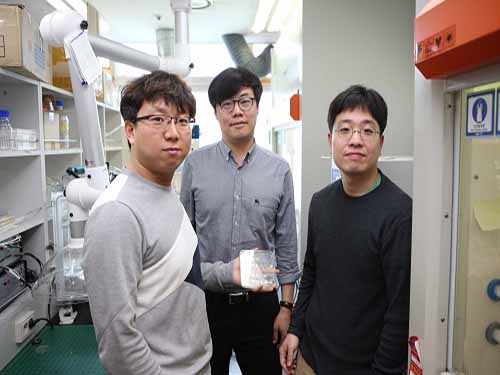 A High-Performance and Cost Effective Hydrogen Sensor
(Research team of Professor Park, Professor Jung, and research fellow Gao Min)
A KAIST research team reported a high-performance and cost effective hydrogen sensor using novel fabrication process based on the combination of polystyrene nanosphere lithography and semiconductor microfabrication processes.
The research team, led by Professor Inkyu Park in the Department of Mechanical Engineering and Professor Yeon Sik Jung in the Department of Materials Science and Engineering, fabricated a nanostructured high-performance hydrogen gas sensor based on a palladium-decorated silicon nanomesh structure made using a polystyrene nanosphere self-assembly method. Their study was featured as the front cover article of journal “Small” (Publisher: Wiley-VCH) on March 8, 2018.
The nanosphere lithography method utilizes the self-assembly of a nanosphere monolayer. This could be an alternative choice for achieving uniform and well-ordered nanopatterns with minimum sub-10 nanometer dimensions. The research team said that the small dimensions of the silicon enhanced the palladium-gating effect and thus dramatically improved the sensitivity.
Hydrogen gas is widely considered to be one of the most promising next-generation energy resources. Also, it is a very important material for various industrial applications such as hydrogen-cooled systems, petroleum refinement, and metallurgical processes. However, hydrogen, which is highly flammable, is colorless and odorless and thus difficult to detect with human senses. Therefore, developing hydrogen gas sensors with high sensitivity, fast response, high selectivity, and good stability is of significant importance for the rising hydrogen economy.
Silicon nanowire-based devices have been employed as efficient components in high-performance sensors for detecting gases and other chemical and biological components. Since the nanowires have a high surface-to-volume ratio, they respond more sensitively to the surrounding environment.
The research team’s gas sensor shows dramatically improved hydrogen gas sensitivity compared with a silicon thin film sensor without nanopatterns. Furthermore, a buffered oxide etchant (BOE) treatment of the silicon nanomesh structure results in an additional performance improvement through suspension of nanomesh strutures from the substrate and surface roughening. The sensor device shows a fast hydrogen response (response time < 5 seconds) and 10 times higher selectivity to hydrogen gas among other gases. Their sensing performance is stable and shows repeatable responses in both dry and high-humidity ambient environments.
Professor Park said that his approach will be very useful for the fabrication of low-cost, high-performance sensors for chemical and biological detection with applications to mobile and wearable devices in the coming era of internet of things (IoTs).
(Figure 1: The front cover image of Small dated on March 8.)
(Figure 2: Gas sensor responses upon the exposure to H2 at various concentrations.)
2018.05.21 View 9329
A High-Performance and Cost Effective Hydrogen Sensor
(Research team of Professor Park, Professor Jung, and research fellow Gao Min)
A KAIST research team reported a high-performance and cost effective hydrogen sensor using novel fabrication process based on the combination of polystyrene nanosphere lithography and semiconductor microfabrication processes.
The research team, led by Professor Inkyu Park in the Department of Mechanical Engineering and Professor Yeon Sik Jung in the Department of Materials Science and Engineering, fabricated a nanostructured high-performance hydrogen gas sensor based on a palladium-decorated silicon nanomesh structure made using a polystyrene nanosphere self-assembly method. Their study was featured as the front cover article of journal “Small” (Publisher: Wiley-VCH) on March 8, 2018.
The nanosphere lithography method utilizes the self-assembly of a nanosphere monolayer. This could be an alternative choice for achieving uniform and well-ordered nanopatterns with minimum sub-10 nanometer dimensions. The research team said that the small dimensions of the silicon enhanced the palladium-gating effect and thus dramatically improved the sensitivity.
Hydrogen gas is widely considered to be one of the most promising next-generation energy resources. Also, it is a very important material for various industrial applications such as hydrogen-cooled systems, petroleum refinement, and metallurgical processes. However, hydrogen, which is highly flammable, is colorless and odorless and thus difficult to detect with human senses. Therefore, developing hydrogen gas sensors with high sensitivity, fast response, high selectivity, and good stability is of significant importance for the rising hydrogen economy.
Silicon nanowire-based devices have been employed as efficient components in high-performance sensors for detecting gases and other chemical and biological components. Since the nanowires have a high surface-to-volume ratio, they respond more sensitively to the surrounding environment.
The research team’s gas sensor shows dramatically improved hydrogen gas sensitivity compared with a silicon thin film sensor without nanopatterns. Furthermore, a buffered oxide etchant (BOE) treatment of the silicon nanomesh structure results in an additional performance improvement through suspension of nanomesh strutures from the substrate and surface roughening. The sensor device shows a fast hydrogen response (response time < 5 seconds) and 10 times higher selectivity to hydrogen gas among other gases. Their sensing performance is stable and shows repeatable responses in both dry and high-humidity ambient environments.
Professor Park said that his approach will be very useful for the fabrication of low-cost, high-performance sensors for chemical and biological detection with applications to mobile and wearable devices in the coming era of internet of things (IoTs).
(Figure 1: The front cover image of Small dated on March 8.)
(Figure 2: Gas sensor responses upon the exposure to H2 at various concentrations.)
2018.05.21 View 9329 -
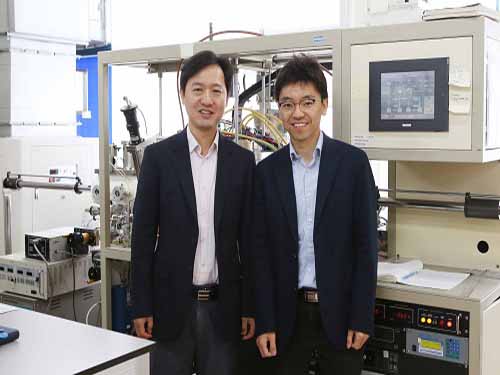 New Material for Generating Energy-Efficient Spin Currents
(Professor Byong-Guk Park (left) and Professor Kab-Jin Kim)
Magnetic random access memory (MRAM) is emerging as next-generation memory. It allows information to be kept even without an external power supply and its unique blend of high density and high speed operation is driving global semiconductor manufacturers to develop new versions continuously.
A KAIST team, led by Professor Byong-Guk Park in the Department of Materials Science and Engineering and Professor Kab-Jin Kim in the Department of Physics, recently has developed a new material which enables the efficient generation of a spin current, the core part of operating MRAM. This new material consisting of ferromagnet-transition metal bilayers can randomly control the direction of the generated spin current unlike the existing ones.
They also described a mechanism for spin-current generation at the interface between the bottom ferromagnetic layer and the non-magnetic spacer layer, which gives torques on the top magnetic layer that are consistent with the measured magnetization dependence.
When applying this to spin-orbit torque magnetic memory, it shows the increased efficiency of spin torque and generation of the spin current without an external magnetic field. High-speed operation, the distinct feature of spin-orbit torque-based MRAM that carries its non-volatility, can significantly reduce the standby power better than SRAM.
This new material will expect to speed up the commercialization of MRAM. The research team said that this magnetic memory will further be applied to mobile, wearable, and IoT devices.
This study, conducted in collaboration with Professor Kyung-Jin Lee from Korea University and Dr. Mark Stiles from the National Institute of Standards and Technology in the US, was featured in Nature Materials in March. The research was funded by the Creative Materials Discovery Program of the Ministry of Science and ICT.
(Figure: Ferromagnet-transition metal bilayers which can randomly control the direction of the generated spin current)
2018.05.11 View 10137
New Material for Generating Energy-Efficient Spin Currents
(Professor Byong-Guk Park (left) and Professor Kab-Jin Kim)
Magnetic random access memory (MRAM) is emerging as next-generation memory. It allows information to be kept even without an external power supply and its unique blend of high density and high speed operation is driving global semiconductor manufacturers to develop new versions continuously.
A KAIST team, led by Professor Byong-Guk Park in the Department of Materials Science and Engineering and Professor Kab-Jin Kim in the Department of Physics, recently has developed a new material which enables the efficient generation of a spin current, the core part of operating MRAM. This new material consisting of ferromagnet-transition metal bilayers can randomly control the direction of the generated spin current unlike the existing ones.
They also described a mechanism for spin-current generation at the interface between the bottom ferromagnetic layer and the non-magnetic spacer layer, which gives torques on the top magnetic layer that are consistent with the measured magnetization dependence.
When applying this to spin-orbit torque magnetic memory, it shows the increased efficiency of spin torque and generation of the spin current without an external magnetic field. High-speed operation, the distinct feature of spin-orbit torque-based MRAM that carries its non-volatility, can significantly reduce the standby power better than SRAM.
This new material will expect to speed up the commercialization of MRAM. The research team said that this magnetic memory will further be applied to mobile, wearable, and IoT devices.
This study, conducted in collaboration with Professor Kyung-Jin Lee from Korea University and Dr. Mark Stiles from the National Institute of Standards and Technology in the US, was featured in Nature Materials in March. The research was funded by the Creative Materials Discovery Program of the Ministry of Science and ICT.
(Figure: Ferromagnet-transition metal bilayers which can randomly control the direction of the generated spin current)
2018.05.11 View 10137 -
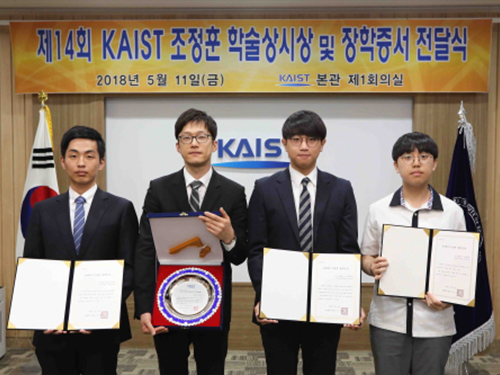 Yoon Ki Hong Named 2018 Jeong Hun Cho Awardee
(From left: PhD candidate Seungkwan Baek from the Department of Aerospace Engineering, Dr. Yoon Ki Hong from ADD, PhD candidate Wonhee Choi from the School of Mechanical Engineering at Korea University, and Jaehun Lee from Kongju National University High School)
Dr. Yoon Ki Hong from the Agency of Defense Development (ADD) was named the 2018 recipient of the Jong-Hoon Cho Award. The award recognizes outstanding young scientists in the field of aerospace engineering annually. The recipient of this award receives a 25 million KRW prize.
The Award Committee said that Dr. Hong has achieved outstanding work in the field of aerospace engineering. In particular, he conducted research on designing an air heating device which is the crucial component for ground experimental equipment. It is required for testing and evaluating supersonic vehicles’ structural strength tests using technology cannot be imported. In cooperation with his colleagues, he succeeded in developing an air heating device, a feat that has only been accomplished by developed countries. He also verified its operational performance.
Moreover, he received the best paper award from Korean Federation of Science and Minister of Defense Acquisition Program Administration’s Prize.
The award was endowed by the family of the late PhD candidate Jeong Hun Cho, who died in a rocket lab accident in the Department of Aerospace Engineering in 2003. Cho was posthumously conferred an honorary doctorate degree.
In Cho’s memory, his father established the ‘Jeong Hun Cho Award and Scholarship’. Since 2005, the scholarship annually selects three young scholars specializing in aerospace engineering from Cho’s alma maters of KAIST, Korea University, and Kongju National University High School.
In addition to Dr. Hong, the Award Committee chose three students for scholarships: PhD candidate Seungkwan Baek from the Department of Aerospace Engineering, PhD candidate Wonhee Choi from the School of Mechanical Engineering at Korea University, and Jaehun Lee from Kongju National University High School.
2018.05.11 View 9745
Yoon Ki Hong Named 2018 Jeong Hun Cho Awardee
(From left: PhD candidate Seungkwan Baek from the Department of Aerospace Engineering, Dr. Yoon Ki Hong from ADD, PhD candidate Wonhee Choi from the School of Mechanical Engineering at Korea University, and Jaehun Lee from Kongju National University High School)
Dr. Yoon Ki Hong from the Agency of Defense Development (ADD) was named the 2018 recipient of the Jong-Hoon Cho Award. The award recognizes outstanding young scientists in the field of aerospace engineering annually. The recipient of this award receives a 25 million KRW prize.
The Award Committee said that Dr. Hong has achieved outstanding work in the field of aerospace engineering. In particular, he conducted research on designing an air heating device which is the crucial component for ground experimental equipment. It is required for testing and evaluating supersonic vehicles’ structural strength tests using technology cannot be imported. In cooperation with his colleagues, he succeeded in developing an air heating device, a feat that has only been accomplished by developed countries. He also verified its operational performance.
Moreover, he received the best paper award from Korean Federation of Science and Minister of Defense Acquisition Program Administration’s Prize.
The award was endowed by the family of the late PhD candidate Jeong Hun Cho, who died in a rocket lab accident in the Department of Aerospace Engineering in 2003. Cho was posthumously conferred an honorary doctorate degree.
In Cho’s memory, his father established the ‘Jeong Hun Cho Award and Scholarship’. Since 2005, the scholarship annually selects three young scholars specializing in aerospace engineering from Cho’s alma maters of KAIST, Korea University, and Kongju National University High School.
In addition to Dr. Hong, the Award Committee chose three students for scholarships: PhD candidate Seungkwan Baek from the Department of Aerospace Engineering, PhD candidate Wonhee Choi from the School of Mechanical Engineering at Korea University, and Jaehun Lee from Kongju National University High School.
2018.05.11 View 9745 -
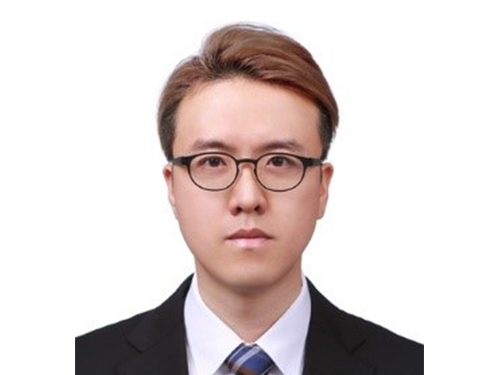 The First Recipient of the KPS Award in Plasma Physics
( Research Professor Sanghoo Park)
Research Professor Sanghoo Park received the Young Researcher Award in Plasma Physics during the Korean Physical Society (KPS)’s Spring Meeting from April 25 to 27.
He is a KAIST graduate with a PhD in Physics and currently holds the position of research professor in the Department of Nuclear and Quantum Engineering.
The Young Researcher Award in Plasma Physics is given to a specialist in plasma who has the potential to make a contribution to plasma and accelerator physics in Korea.
Professor Park has gained recognition for his work, including awards, publications in 24 journals, and 12 technical patent registrations of plasma, which led to his selection as the recipient of this award.
He is now conducting a leading role in this field nationally and internationally by delving into the study of partially-ionized plasma.
Professor Park said, “It is my great honor to become the first recipient of the Young Researcher Award in Plasma Physics. I will continue to engage in research to develop the field of plasma in Korea.”
2018.05.08 View 6661
The First Recipient of the KPS Award in Plasma Physics
( Research Professor Sanghoo Park)
Research Professor Sanghoo Park received the Young Researcher Award in Plasma Physics during the Korean Physical Society (KPS)’s Spring Meeting from April 25 to 27.
He is a KAIST graduate with a PhD in Physics and currently holds the position of research professor in the Department of Nuclear and Quantum Engineering.
The Young Researcher Award in Plasma Physics is given to a specialist in plasma who has the potential to make a contribution to plasma and accelerator physics in Korea.
Professor Park has gained recognition for his work, including awards, publications in 24 journals, and 12 technical patent registrations of plasma, which led to his selection as the recipient of this award.
He is now conducting a leading role in this field nationally and internationally by delving into the study of partially-ionized plasma.
Professor Park said, “It is my great honor to become the first recipient of the Young Researcher Award in Plasma Physics. I will continue to engage in research to develop the field of plasma in Korea.”
2018.05.08 View 6661 -
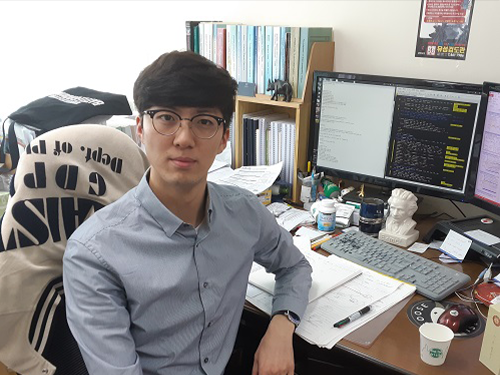 Park Chosen for Principality of Monaco/ITER Postdoctoral Fellowship
(Jaesun Park in the Integrated Master's and Doctoral Degree Program )
Jaesun Park from the Department of Physics, was selected as a Principality of Monaco/ITER Postdoctoral Fellowship recipient.
This program was established by the Principality of Monaco and an international organization, ITER, in January 2008 to support postdoctoral researchers who will be working for ITER. It is a relatively competitive program because it chooses only five people every two years.
The selected postdoctoral researchers will be working for ITER for two years while conducting research projects with outstanding researchers in the field of nuclear fusion.
ITER, one of the most ambitious energy projects, was launched in 1985 with the purpose of carrying out joint research on nuclear fusion energy. Currently, about 800 people are working for this organization.
Seven ITER member countries (i.e. Korea, the European Union, the United States, China, Japan, Russia, and India) are sharing the expenses and engaging in mega-scale science projects. Korea shares 9.1% (20 billion Euro) of the total construction costs of ITER experimental devices.
Park will begin his duties in early 2019.
2018.05.04 View 9001
Park Chosen for Principality of Monaco/ITER Postdoctoral Fellowship
(Jaesun Park in the Integrated Master's and Doctoral Degree Program )
Jaesun Park from the Department of Physics, was selected as a Principality of Monaco/ITER Postdoctoral Fellowship recipient.
This program was established by the Principality of Monaco and an international organization, ITER, in January 2008 to support postdoctoral researchers who will be working for ITER. It is a relatively competitive program because it chooses only five people every two years.
The selected postdoctoral researchers will be working for ITER for two years while conducting research projects with outstanding researchers in the field of nuclear fusion.
ITER, one of the most ambitious energy projects, was launched in 1985 with the purpose of carrying out joint research on nuclear fusion energy. Currently, about 800 people are working for this organization.
Seven ITER member countries (i.e. Korea, the European Union, the United States, China, Japan, Russia, and India) are sharing the expenses and engaging in mega-scale science projects. Korea shares 9.1% (20 billion Euro) of the total construction costs of ITER experimental devices.
Park will begin his duties in early 2019.
2018.05.04 View 9001 -
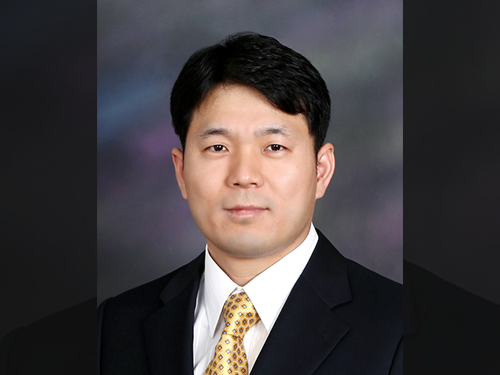 Professor Hee-Sung Park Named Scientist of May
(Professor Hee-Sung Park)
Professor Hee-Sung Park from the Department of Chemistry was named ‘Scientist of May’ sponsored by the Ministry of Science and ICT and the National Research Foundation of Korea. Professor Park was honored in recognition of his developing a tool to engineer designer proteins via diverse chemical modifications. This approach provides a novel platform for investigating numerous diseases such as cancer and dementia.
His research focuses on the production of synthetic proteins and the generation of diverse protein functions as well as the designing and engineering of new translation machinery for genetic code expansion, and the application of synthetic biology techniques for basic cell biology and applied medical science.
Post-translational modifications (PTMs) are constantly taking place during or after protein biosynthesis. PTMs play a vital role in expanding protein functional diversity and, as a result, critically affect numerous biological processes. Abnormal PTMs have been known to trigger various diseases including cancer and dementia. Therefore, this technology enables proteins to reproduce with specific modifications at selected residues and will significantly help establish experimental strategies to investigate fundamental biological mechanisms including the development of targeted cancer therapies.
Professor Park also received 10 million KRW in prize money.
2018.05.04 View 9977
Professor Hee-Sung Park Named Scientist of May
(Professor Hee-Sung Park)
Professor Hee-Sung Park from the Department of Chemistry was named ‘Scientist of May’ sponsored by the Ministry of Science and ICT and the National Research Foundation of Korea. Professor Park was honored in recognition of his developing a tool to engineer designer proteins via diverse chemical modifications. This approach provides a novel platform for investigating numerous diseases such as cancer and dementia.
His research focuses on the production of synthetic proteins and the generation of diverse protein functions as well as the designing and engineering of new translation machinery for genetic code expansion, and the application of synthetic biology techniques for basic cell biology and applied medical science.
Post-translational modifications (PTMs) are constantly taking place during or after protein biosynthesis. PTMs play a vital role in expanding protein functional diversity and, as a result, critically affect numerous biological processes. Abnormal PTMs have been known to trigger various diseases including cancer and dementia. Therefore, this technology enables proteins to reproduce with specific modifications at selected residues and will significantly help establish experimental strategies to investigate fundamental biological mechanisms including the development of targeted cancer therapies.
Professor Park also received 10 million KRW in prize money.
2018.05.04 View 9977